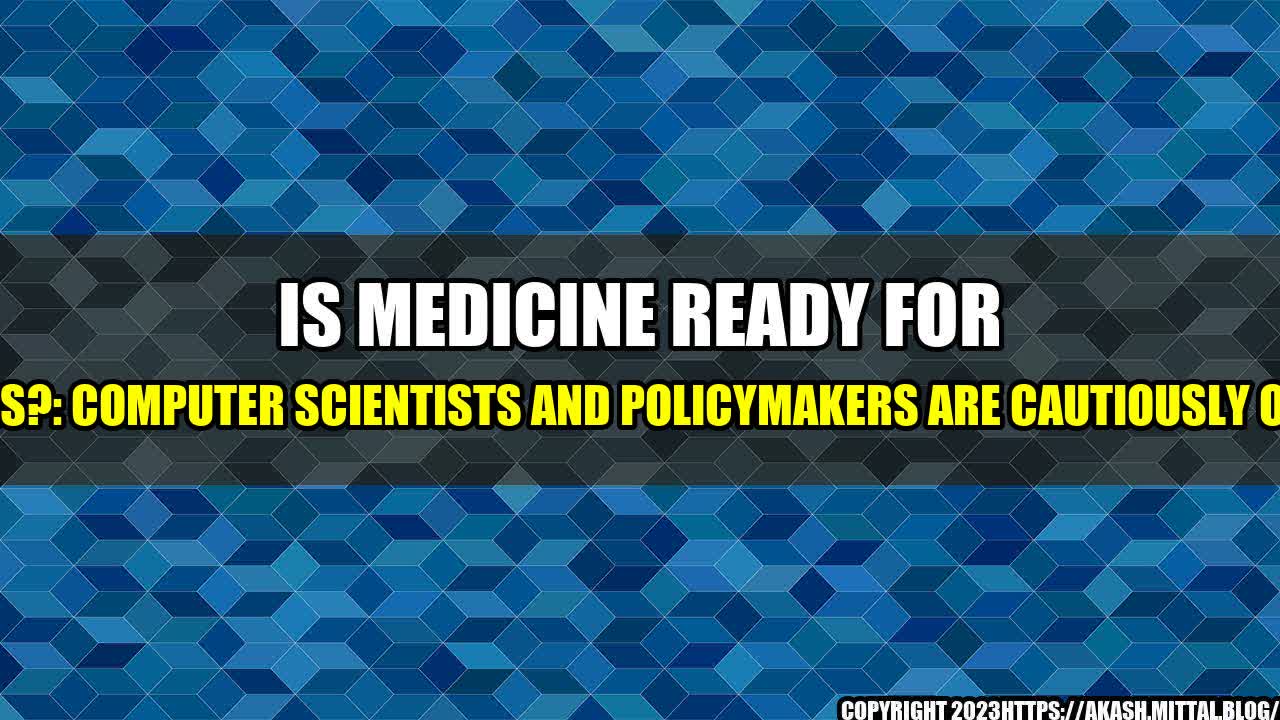The Story of How AI is Revolutionizing Medicine
Once upon a time, doctors could only rely on their years of education and experience to make difficult diagnoses and treatment decisions. But today, with the rise of artificial intelligence (AI), doctors have a powerful new tool at their disposal. Advanced algorithms and machine learning techniques allow doctors to analyze vast amounts of data in real time, providing them with insights that human brains alone could never achieve.
From detecting cancer in its early stages to predicting the risk of heart disease, AI is already transforming the field of medicine. But is medicine really ready for AI doctors? As computer scientists and policymakers explore this question, there are reasons to be both excited and cautious about the future of AI in healthcare.
AI in Medicine
So, what are some concrete examples of AI in action in the field of medicine? Let's take a look:
- AI for diagnosis: One study found that an AI system was able to accurately diagnose skin cancer at a level comparable to human dermatologists. Additionally, researchers have explored using AI to identify certain types of cancer cells and predict the progression of disease in patients.
- AI for personalized treatment: By analyzing patient data such as medical history, genetic information, and lifestyle factors, AI systems can create personalized treatment plans that are tailored to the individual patient. This can lead to more effective treatment outcomes and better patient satisfaction.
- AI for drug discovery: Drug discovery is a time-consuming and expensive process, but AI has the potential to speed it up by analyzing large amounts of data to identify potential drug candidates. Researchers have already used AI to predict the efficacy of a drug for treating Alzheimer's disease, as well as to identify new drugs for cancer and autoimmune diseases.
These examples show just a few of the ways that AI is already making a significant impact in the field of medicine. But there are also challenges and concerns that must be addressed as AI continues to play a growing role in healthcare.
The Challenges and Concerns of AI in Medicine
As with any new technology, there are challenges and concerns that must be addressed when it comes to AI in medicine. Some of the key issues include:
- Data privacy and security: With sensitive patient data being used to train and improve AI algorithms, it's crucial that healthcare organizations take appropriate steps to protect patient privacy and prevent data breaches.
- Accountability and transparency: As AI systems become more complex and autonomous, it can be difficult to understand how they are making decisions. To ensure that AI is being used ethically and in the best interests of patients, it's important that developers and healthcare providers strive for transparency and accountability.
- Regulatory and ethical considerations: As AI begins to take on more and more responsibilities in healthcare, there will be an increasing need for clear regulations and ethical guidelines to govern its use. Policymakers and industry leaders must work together to ensure that AI is used in a way that is safe, effective, and morally responsible.
By addressing these challenges head-on, policymakers and healthcare providers can work to build a future where AI and human doctors can work together to provide better, more personalized care for patients.
The Future of AI in Medicine: 3 Key Takeaways
As we think about the future of AI in medicine, there are three key takeaways to keep in mind:
- AI is already making a significant impact: The examples we've explored show that AI is already changing the way doctors diagnose and treat patients, and this trend is only going to accelerate in the years ahead.
- There are challenges to be addressed: From data privacy to regulatory concerns, there are significant challenges that must be addressed as AI becomes more prevalent in healthcare.
- AI and human doctors can work together: Rather than replacing human doctors, AI has the potential to augment their skills and expertise. By working together, doctors and AI can provide patients with better, more personalized care than ever before.
By keeping these takeaways in mind, we can take a careful and cautious approach to the use of AI in medicine, working to ensure that patients are the ultimate beneficiaries of this exciting new technology.

Curated by Team Akash.Mittal.Blog
Share on Twitter Share on LinkedIn